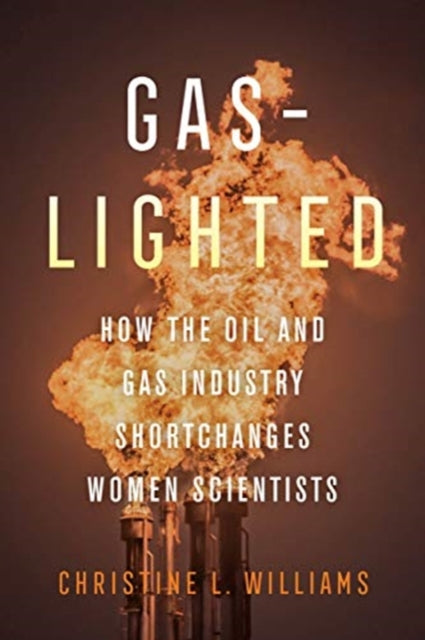Christine L. Williams
Gaslighted: How the Oil and Gas Industry Shortchanges Women Scientists
Gaslighted: How the Oil and Gas Industry Shortchanges Women Scientists
YOU SAVE £4.58
- Condition: Brand new
- UK Delivery times: Usually arrives within 2 - 3 working days
- UK Shipping: Fee starts at £2.39. Subject to product weight & dimension
Bulk ordering. Want 15 or more copies? Get a personalised quote and bigger discounts. Learn more about bulk orders.
Couldn't load pickup availability
- More about Gaslighted: How the Oil and Gas Industry Shortchanges Women Scientists
Despite efforts to promote diversity and gender equality in the oil and gas industry, the industry remains overwhelmingly white and male. Sociologist Christine L. Williams' decade-long investigation found that when the industry expands, women may be able to walk through the door, but when it contracts, the door becomes a revolving one, whirling ever faster as companies retreat to their white male core.
Format: Paperback / softback
Length: 262 pages
Publication date: 12 October 2021
Publisher: University of California Press
The oil and gas industry stands as one of the world's most affluent and influential sectors, boasting a wealth of resources and a formidable presence. In recent years, companies have made grandiose claims in support of diversity, implementing highly publicized programs aimed at empowering women in STEM fields, and fostering a tight labor market characterized by near parity in the number of women pursuing geoscience credentials. These developments have raised hopes for greater progress for women in the corporate ranks of this industry. However, despite the rhetoric of the "great crew change," the reality remains stark: the industry remains overwhelmingly white and male. Sociologist Christine L. Williams has embarked on a decade-long investigation to unravel the mystery of women's absence in the oil and gas industry. This comprehensive research involved one hundred in-depth interviews, a longitudinal survey, and ethnographic studies, providing a unique perspective on the industry's dynamics.
Williams' findings reveal a fascinating pattern: when the industry experiences expansion, women may find opportunities to enter the field, but as the industry contracts, the door becomes a revolving one, spinning ever faster as companies retreat to their predominantly white male core. These gendered outcomes are obscured by firms' stated commitments to diversity in hiring and the language of merit. However, the truth lies hidden beneath the surface, as organizational gaslighting emerges as a radical dissonance between language and practice. Williams courageously exposes this discrepancy, shedding light on the pervasive nature of gaslighting in the industry and its detrimental impact on women's advancement.
The oil and gas industry's failure to promote diversity and inclusion is not solely a matter of gender inequality but also reflects broader societal issues. The industry's reliance on traditional male-dominated roles and stereotypes has perpetuated a culture of exclusion and discrimination, hindering the progress of women and other marginalized groups. Moreover, the industry's complex and highly technical nature often poses barriers to entry for women, who may face systemic challenges in accessing education, training, and career advancement opportunities.
To address these challenges, there is a need for a concerted effort from industry leaders. Companies must prioritize diversity and inclusion in their hiring practices, ensuring that a wide range of candidates, including women and individuals from diverse backgrounds, have equal access to opportunities. Additionally, firms should invest in training and development programs to equip women with the skills and knowledge required to thrive in the industry. Moreover, industry leaders should foster a culture of support and mentorship for women, creating a safe and inclusive environment where they can grow and excel.
Furthermore, policymakers and regulatory bodies should play a crucial role in promoting diversity and inclusion in the oil and gas industry. They should establish policies and regulations that encourage diversity in the workforce, promote equal pay and opportunities for women, and address discrimination and harassment in the workplace. Additionally, policymakers should invest in research and development programs to address the gender gap in the industry, including initiatives to promote women's leadership and entrepreneurship.
In conclusion, the oil and gas industry's failure to promote diversity and inclusion is a complex issue that requires a multifaceted approach. By prioritizing diversity and inclusion in hiring practices, investing in training and development programs, fostering a culture of support and mentorship, and engaging with policymakers and regulatory bodies, the industry can overcome its historical barriers and create a more equitable and inclusive workplace for all. Only by embracing diversity and inclusion can the oil and gas industry achieve its full potential and contribute to a sustainable and prosperous future.
Weight: 310g
Dimension: 140 x 211 x 18 (mm)
ISBN-13: 9780520385283
This item can be found in:
UK and International shipping information
UK and International shipping information
UK Delivery and returns information:
- Delivery within 2 - 3 days when ordering in the UK.
- Shipping fee for UK customers from £2.39. Fully tracked shipping service available.
- Returns policy: Return within 30 days of receipt for full refund.
International deliveries:
Shulph Ink now ships to Australia, Belgium, Canada, France, Germany, Ireland, Italy, India, Luxembourg Saudi Arabia, Singapore, Spain, Netherlands, New Zealand, United Arab Emirates, United States of America.
- Delivery times: within 5 - 10 days for international orders.
- Shipping fee: charges vary for overseas orders. Only tracked services are available for most international orders. Some countries have untracked shipping options.
- Customs charges: If ordering to addresses outside the United Kingdom, you may or may not incur additional customs and duties fees during local delivery.


